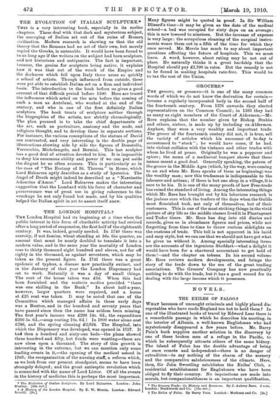THE LONDON HOSPITAL.t
THE London Hospital had its beginning at a time when the public interest in this form of charitable activity had revived after a long period of suspension, the first half of the eighteenth century. It was, indeed, greatly needed. In 1740 there was scarcity, if not famine, wheat standing at 56s. the quarter, an amount that must be nearly doubled to translate it into a modern value, and in the same year the mortality of London rose to thirty thousand eight hundred and eleven, not far off eighty in the thousand, as against seventeen, which may be taken as the present figure. In 1741 there was a great epidemic of typhus, a disease now practically extinct, and in the January of that year the London Dispensary had net to work. Naturally it was a day of small things. The rent of the house taken was £16. When this had Leen furnished and the materia mediae provided " there was one shilling in the Bank." In about half-a-year, however, larger quarters were required, and a house at £25 rent was taken. It may be noted that one of the Committee which managed affairs in these early days was a Buxton, and in the hundred and seventy years that have passed since then the name has seldom been missing. The first year's income was £298 14s. 6d., the expenditure £206 5s. 6d.,—soap costing 10s. 6d.! In 1908 water alone coat 2296, and the spring cleaning £2,924. The Hospital, into which the Dispensary was developed, was opened in 1757. It had then a hundred and sixty-one beds—the plans showed three hundred and fifty, but funds were wanting—there are now close upon a thousand. The story of this growth is interesting in the extreme, but we can mention only some leading events in it,—the opening of the medical school in 1783; the reorganisation of the nursing staff, a reform which, as we look from our present standpoint, seems to have been strangely delayed; and the great antiseptic revolution which is connected with the name of Lord Lister. Of all the events in the history of medicine this is perhaps the most important.
• The Erolution of Dalian Sculpture.. By Lord Balcarree. London: John Murray. [Ma. net.] Histoni of the London Hospital. By E. W. Morris. London : Edward Arnold. Os.]
Many figures might be quoted in proof. In Sir William Blisard's time—it may be given as the date of the medical school—a bed was occupied for sixty days on an average ; this is now lowered to nineteen. But the increase of expense is very large : the scrupulous cleaning of the surgical instru- ments wears them out in a fifth of the time for which they once served. Mr. Morris has much to say about important questions affecting the future of hospitals. This we must leave. A word, however, about rating may be not out of place. He naturally thinks it a great hardship that the Hospital should pay £1,700 in rates. But the remedy is not to be found in making hospitals rate-free. This would be to tax the rest of the Union.










































 Previous page
Previous page